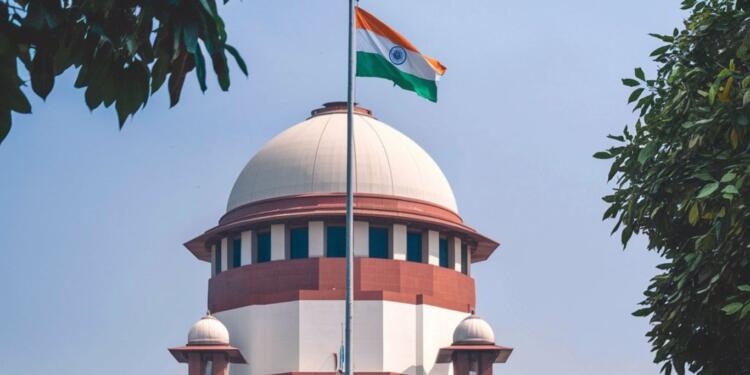In a landmark judgement, the Supreme Court of India on Thursday (17th October) upheld the constitutional validity of Section 6A of the Citizenship Act 1955 in a split 4:1 verdict. It recognises the Assam Accord and mentions that people who entered India between 1st January 1966 and 25th March 1971 and had been living in Assam, were allowed to register as citizens of India. Pertinently, today’s landmark verdict will likely have a significant bearing on the Assam National Register of Citizens (NRC) list.
Today’s verdict was delivered by the 5-judge Constitutional Bench. Chief Justice of India DY Chandrachud, Justices Surya Kant, MM Sundresh, JB Pardiwala, and Manoj Misra gave the majority verdict, while Justice Pardiwala gave the dissenting judgement.
Majority Verdict
Delivering the majority verdict, CJI DY Chandrachud held that the Assam Accord was a political solution to the problem of illegal migration and that Section 6A was the legislative solution. They also held that the Parliament had the legislative competence to enact the provision. They ruled that Section 6A was enacted to balance the humanitarian concerns with the need to protect the local population.
The majority verdict upheld that it was rational to single out Assam from other states noting that while West Bengal shared a larger border, the percentage of immigrants among the local population in Assam was higher there than in other border states.
According to the majority verdict, the impact of 40 lakh migrants in Assam is greater than the 57 lakh migrants in West Bengal as Assam has lesser land area as compared to West Bengal.
The majority also upheld the 25th March 1971 cut-off date as rational, a date which marked the end of the Bangladesh liberation war and the court saw the objective of the provision in the backdrop of the Bangladesh war.
The majority verdict ruled that Section 6A was “neither over-inclusive nor under-inclusive.”
CJI Chandrachud observed that the mere presence of different ethnic groups in a State does not mean that the fundamental right to protect linguistic and cultural heritage as per Article 29(1) of the Constitution has been infringed.
It is pertinent to note that during the hearing, the Constitutional bench had directed the Ministry of Home Affairs to furnish data regarding the influx of illegal immigrants to Assam and North Eastern states post the declaration of Bangladesh independence, that is, 25th March 1971. The court also asked them to make data-based disclosures under various heads including the grant of citizenship to immigrants in different periods, and the workings of the Foreigners Tribunals established among other things.
However, the Union Home Ministry informed the Court that it could not provide accurate data on the illegal migration of foreigners into India because such migrations happen in a secretive manner. In its affidavit, the Ministry stated that 14,346 foreign nationals were deported from the country between 2017 and 2022. Additionally, 17,861 migrants who had entered Assam between January 1966 and March 1971 were given Indian citizenship.
Section 6A of the Citizenship Act 1955
Section 6A of the Citizenship Act 1955, the provision that was upheld today by the Supreme Court, allows foreign migrants of Indian origin, who came to Assam after the 1st January 1966 but before the 25th March 1971, to seek Indian citizenship.
It was inserted in 1985 in the wake of the Assam Accord, an agreement forged between the Government of India and the leaders of the Assam movement who held protests for the removal of illegal migrants who entered Assam from Bangladesh. 25th March 1971 was set as the cut-off date as it was the day when the Bangladesh liberation war ended.
Some local groups from Assam had challenged this provision, alleging that it legalised illegal infiltration of foreign migrants from Bangladesh.
Guwahati-based civil society group, Assam Sanmilita Mahasangha challenged the Section 6A in 2012. It alleged that the provision was discriminatory, arbitrary, and unlawful in nature. They urged the court to intervene by instructing the relevant authority to update the National Register of Citizens (NRC) for Assam based on the information from the 1951 NRC. They contested that the NRC should not rely on electoral rolls before March 24, 1971. Later, other organisations from Assam also moved petitions to challenge this provision.
The case was first heard in 2014 by a two-judge bench headed by Justice Rohinton Nariman who then referred the matter to a Constitution Bench. The bench was constituted on April 19, 2017. However, four of the Justices on the bench – Madan B. Lokur, R.K. Agarawal, Prafulla Chandra Pant, and Ashok Bhushan retired, leaving Justice D.Y. Chandrachud sole Justice on the bench.
After a panel of five judges was formed for the third time, the hearings began on 5th December and finished on 12 December last year. Back then, the court had reserved the order in this case. Today, it has upheld Section 6A of the Citizenship Act with a 4:1 majority verdict.

























